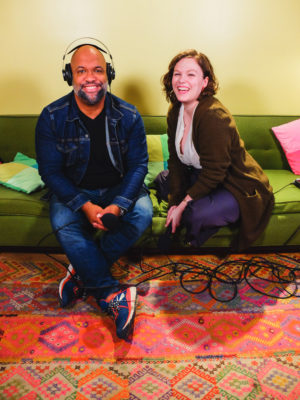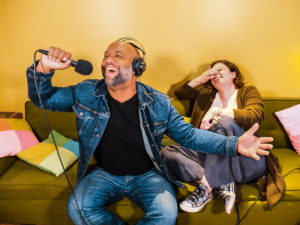
Among its many effects, the Covid-19 pandemic has left a huge mental health strain in its wake via the losses of loved ones, jobs, income and/or food security.
For some, there has been the added strain of running ”” or even losing ”” their own businesses through the pandemic. Adapting to regulations, on-site Covid transmission risks and changes in consumer behaviors and preferences has become the norm.
Small business owners Mike Veny and Leanna Lee, based in the Orange County village of Monroe, say they know just how stressful the situation can be. That was the impetus behind their new podcast, “Bettermental,” devoted to discussing topics surrounding mental health and aimed at small business owners.
Veny and Lee have both learned to manage mental health challenges throughout their lives, and hope to share that wisdom and further the discourse around mentally healthy, sustainable business practices. Veny ”” a mental health speaker, author, writer, certified corporate wellness specialist and owner of a training company ”” met Lee in 2017 at a self-employment conference.
Lee, a writer whose original background in technological and big-tech topics has transitioned more to mental health, workplace, disability ”” a topic she also has personal experience with ”” and related business and labor topics, said the pair have been collaborating ever since.
Their previous podcast, “Self-Employed Momentum,” explored topics relating to self-employment, but they eventually discovered their desire to tighten the focus more toward the intersection of mental health and business leadership.
“It evolved into (Bettermental),” Veny said. “We really took some time to sit down and think about who we wanted to serve and realized that there is a real gap in information available for business owners around this topic.
“You”™ve got your stress and mindfulness stuff that’s out there, and that’s great. We’re not knocking that at all,” he expanded. “But to really address questions like, what if you’ve got a mental health condition and you have to bring in money? Or dealing with toxic clients or with a team that might be struggling too, how do you do that?
“It’s been a great journey for us to explore that not only for ourselves, but to help the world,” Veny said.
“The big shift between the two (podcasts) was Covid really, and realizing that 2020 and 2021 have been years of really interesting mental health conversations,” Lee added. “Conversations about mental health in the workplace and mental health benefits and how we incorporate wellness into the workplace. We had a really good think about that and we wanted to focus our attention even more on that workplace focus.”
“When someone running a business also has mental health challenges going into that, that could be a recipe for a lot of problems right there,” Veny said. “One of the things we’re hoping to do in this podcast is really address that to help out business owners who might be struggling.”
He added that the podcast is relevant not only to small business owners, but leaders of businesses of any size.
In fact, the hosts also believe that new workplace norms that became more popular during the pandemic, like working from home, have started to make many employees deal with a lot of the same issues.
“If you think about it, we’ve got remote employees now who are working from home for larger companies, and they might identify with some of this material too ”” and some have, because some of the experiences that remote employees have now … are many of the experiences that those of us who’ve been self-employed for years have actually dealt with,” Veny said. “Like the boundaries that you need to set when you’re working at home, the kind of communication you need to have with the people you live with and stuff like that.”
Lee said that she understands firsthand the way that the pandemic has exacerbated existing mental health conditions, maintaining that the podcast is one way of addressing those issues and bringing a new awareness about them to others.
Veny said that his experiences in consulting, training, completing research and assessing needs for companies like T-Mobile, Travelers Insurance, Aetna, CVS Health and the Wounded Warrior Project have given him a solid perspective on the issues facing business leaders and employees today, as well as a deeper understanding of the sense of being overwhelmed that so many people face both in their work and their personal lives.
It has also shown him the true value of mental health prioritization and services, especially in a workplace setting, where it makes sense not only from a human standpoint, but also as an investment.
“The return on investment is so huge when you actually really start to invest in your mental health and the mental health of your company,” he said. “It’s just huge for everyone. It’s not this extra, cute thing that everyone’s talking about right now that would be good to do so people will like you. It really affects things. It affects culture, it affects everyone’s life.”
 Lee reiterated the importance of building a workplace culture that is not only symbolically supportive of employees”™ mental health, but also truly advocating for accessible, sustainable practices.
Lee reiterated the importance of building a workplace culture that is not only symbolically supportive of employees”™ mental health, but also truly advocating for accessible, sustainable practices.
“Mental health has become a trendy conversation topic,” she said, “but there’s a big, big difference between foundational practices of companies that are literally building better and mentally healthier businesses, and those simply slapping on the band-aid of mental health benefits and hoping that that will do what they needed to.”
Lee and Veny see this moment as a “golden opportunity” to help people gain more perspective on such issues.
They launched Bettermental in October, with the first episode centering around the recognition and management of stress, complete with tips and further resources for listeners to explore.
Recording out of Veny”™s basement studio in Monroe, they will continue to offer their insights about exhaustion, burnout, leading a mentally healthy team and other topics throughout the fall season.
The podcast and more information is available at bettermental.fm and most major podcast streaming platforms.





















